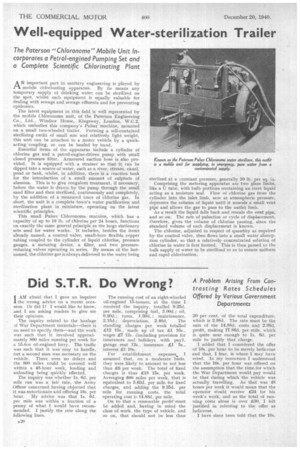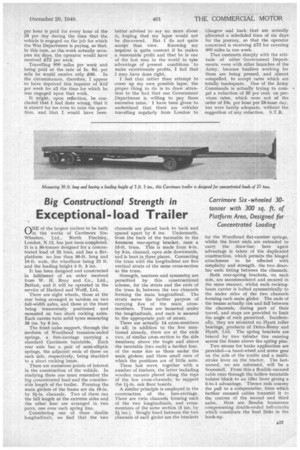Did S.T.R. Do Wrong?
Page 28

Page 29

If you've noticed an error in this article please click here to report it so we can fix it.
I AM afraid that I gave an inquirer the wrong advice on a recent occasion. Or did I? I would like to know, and I am asking readers to give me their opinions.
The inquiry related to the haulage of War Department materials—there is no need to specify them—and the work was such that it involved approximately 800 miles running per week for a 15-ton oil-engined lorry. The traffic was such that it was easy to handle, but a second man was necessary on the vehicle. There were no delays and the 800 miles could be covered well within a 48-hour week, loading and unloading being quickly effected.
The inquiry was whether 1s. 6c1. per mile run was a fair rate, the Army Officer concerned having objected that it was extortionate and offering 105. per hour. My advice was that 1s. 6d. per mile was within a fraction of a penny of what I would have recommended. I justify the rate along the following lines,
a.20
The running cost of an eight-wheeled oil-engined 15-tonner, at the time I receiVed the inquiry, totalled 9.25d, per mile, comprising fuel, 3.00d.; oil, 0.20d.; tyres, 1.50d.; maintenance, 2.15d.; depreciation, 2.40d. • The standing charges per, week totalled £12 15s., made up of tax £.1 16s., wages £7 12s. (including provision for insurances and holidays with pay), garage rent 12s., insurance £1 5s., interest £1. 10s.
For establishment expenses. I assumed that, on a moderate basis, they were likely .to amount to not less than £6 per week. The total of fixed charges is thus £18 15s, per week. Averaging 800 miles per week, that is equivalent to 5.63d. per mile for fixed charges, and adding the 9.25d. per mile for running costs, the total operating cost is 14.88d. per mile.
On to that a reasonable profit\ must be added and, having in mind the class of work, the type of vehicle, and so on, that should not be -less than
20 per cent, of the total expenditure, which is 2.98d. The rate must be the sum of the 14.88d. costs and 2.08d. profit, making 17.86d. per mile, which is quite near enough to is, 6d. per mile to justify that charge.
I added that I considered the offer of 10s. per hour to be merely ludicrous and that, I fear, is where, I may have erred. In my innocence I understood that the 10s. per hour was offered on the assumption that the time.for which the War Department would pay would be that during which the vehicle was actually travelling. As that was 48 hours per week it would mean that the operator ,,V-oulcl receive £24 for his week's work, and as the total of running costs alone is over £30, I felt justified in referring to the offer as ludicrous.
I have since been told that the 10s.
per hour is paid for every hour of the 24 per day during the time that the vehicle is engaged on the job for which the War Department is paying, so that, in this case, as the work actually occupies six days, the operator would have received £72 per week.
Travelling 800 miles per week and being paid at the rate of is. 6d. per mile he would receive only £60. In the circumstances, therefore, I appear to have deprived this inquirer of £12' per week for all the time for which he was engaged upon that work.
It might, upon reflection, be concluded that I had done wrong, that it is absurd for me even to raise the question, and that I would have been better advised to say no more about it, hoping that my lapse would not be discovered. But I do not quite accept that view. Knowing my inquirer is quite, content if he makes a reasonable profit and that he is one of the last men in the world to talte advantage of •present conditions to make extortionate profits, I feel that I may have done right.
I feel that rather than attempt to cover up my own possible lapse, the proper. thing to do is to draw attention to the fact that one Government Department is willing to pay these excessive rates. • I have been given to understand that there are vehicles travelling regularly from London to Glasgow and back that are actually allocated a scheduled time of six days for the journey, so that the operator concerned is receiving £72 for covering 800 miles in one week.
That contrasts sharply with the attitude of other Government Departments, even with other branches of the Army, because hauliers working for them are being pressed, and almost compelled, to accept rates which are totally inadequate. One of the Army Commands is actually trying to com• pel a reduction of 25 per cent, on previous rates, which were not of the order of 10s. per hour per 24-hour day, hut were barely adequate, without the suggestion of any reduction. S.T.R.




















































